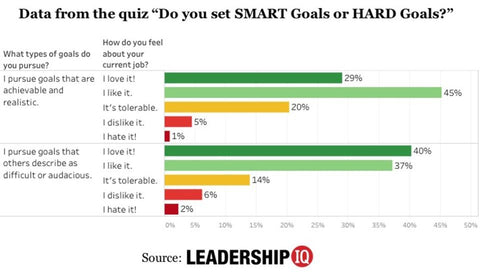People Who Set SMART Goals Are Less Likely To Love Their Job
This article originally appeared on Forbes by Mark Murphy, Founder of Leadership IQ
If you’ve had a job for any length of time, you’ve undoubtedly set a SMART Goal (most commonly defined as Specific, Measurable, Achievable, Realistic, and Time-bound). But while everyone knows how to set a SMART Goal, what most people don’t know is that they could really be hurting how they feel about their job.
More than 5,000 people have taken the online test “Do you set SMART Goals or HARD Goals?”Respondents answer 9 questions about their goal setting processes, rating such factors as their emotional commitment, urgency, anxiety, number of goals and goal difficulty. One such question asks respondents to choose between these 2 statements:
- I pursue goals that are achievable and realistic.
- I pursue goals that others describe as difficult or audacious.
When we look at the very definition of SMART Goals (especially the achievable and realistic parts) the first of those choices is a pretty good proxy for whether someone sets SMART Goals. Currently, around two-thirds of people say they pursue goals that are achievable and realistic. But while that choice wins the popularity contest, it loses on a much more important issue.
After test-takers answer questions about their goals, they’re asked to complete a few research questions, including “How do you feel about your current job?” And when we combine those responses with the aforementioned goal question, a disturbing finding emerges.

As you can see in the chart, only 29% of people who pursue achievable and realistic goals love their job. But a far greater 40% of difficult and audacious goal setters love their job.
Now, can we say with certainty that setting SMART Goals directly causes unhappiness? No, of course not. I’m pretty sure that someone like Jeff Bezos could transform one of his hard audacious goals into something easy and achievable and it wouldn’t immediately eradicate his love of, and passion for, Amazon. Similarly, it’s entirely possible that the late Steve Jobs set an achievable goal here or there without instantly suffering ill effects. But are those the types of people who make a habit of setting achievable and realistic goals? Of course not, and that’s part of the reason why they’re in the pantheon of business leaders.
The kind of person who is likely to set difficult or audacious goals is also the kind of person who is more likely to love their job. This may be partly due to the workplace reality that people who go after big goals are more likely to be successful. And your level of success is typically a big factor in determining how much you’ll love your job.
Unfortunately, the reality is that most people are not setting big or audacious goals. Nor are the goals that people set helping them achieve great success in their jobs.
One of my studies, called Are SMART Goals Dumb?, tracked 4,182 workers from 397 organizations to see what kind of goal setting processes actually help employees achieve great things. (After all, isn’t that the whole point of having goals?). Among dozens of findings, we discovered that only 15% of employees strongly agree that their goals will help them achieve great things. And only 13% of employees strongly agree that their goals this year will help them maximize their full potential.
So, what can you do about this? For starters, stop worrying about whether your goals are achievable and realistic and instead set some goals that will force you out of your comfort zone.
You can do this by asking yourself what skills you’ll need to learn to achieve your goal. If you won’t have to learn something to achieve your goal, that means you’ve already got all the necessary tools, and thus your goal is far too easy. You want a goal to stretch and activate your brain, and the best way to accomplish that is forcing yourself to learn something new. And frankly, people who are constantly learning are generally more successful and happier than those that stagnate.
Also, ask yourself whether your goal is a fait accompli (or slam dunk or whatever). In other words, is the achievement of your goal guaranteed? Ironically, if your goal is guaranteed to succeed, you won’t feel particularly proud or accomplished when it does. Goals that give you a deep sense of accomplishment and pride must be hard enough that their outcome is uncertain. This doesn’t mean you should set goals with zero chance of success; that will just be a different kind of demotivating. But setting a goal with a fifty-fifty chance of success is difficult and audacious enough to give you a huge sense of accomplishment when you succeed.
So remember, 40% of difficult and audacious goal setters love their job while only 29% of people who pursue achievable and realistic goals love their job. There’s certainly more to having a job you love than just setting tough goals, but it’s such an easy place to start there’s just no excuse not to try.
Mark Murphy is the founder of Leadership IQ and author of Truth At Work: The Science Of Delivering Tough Messages.







